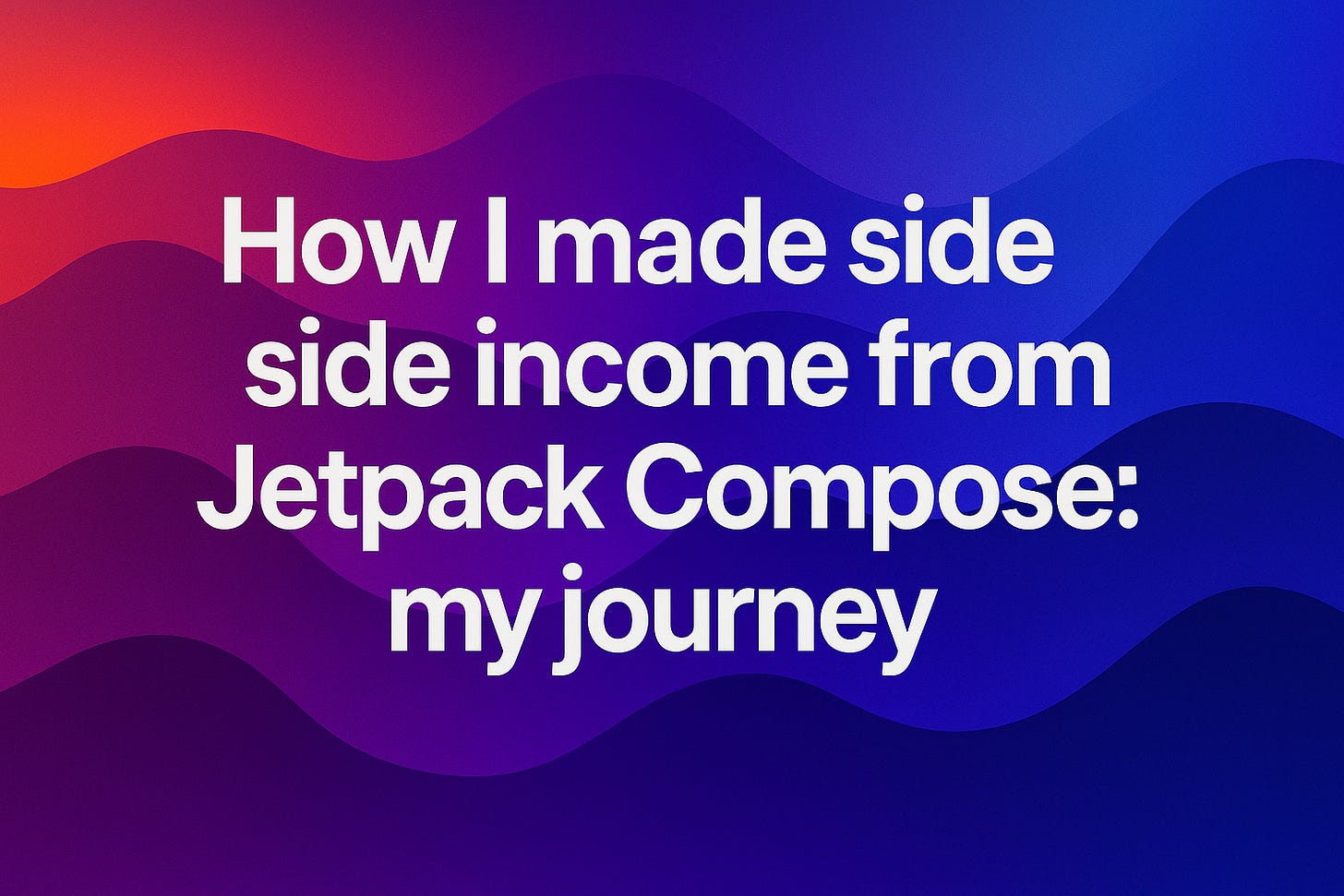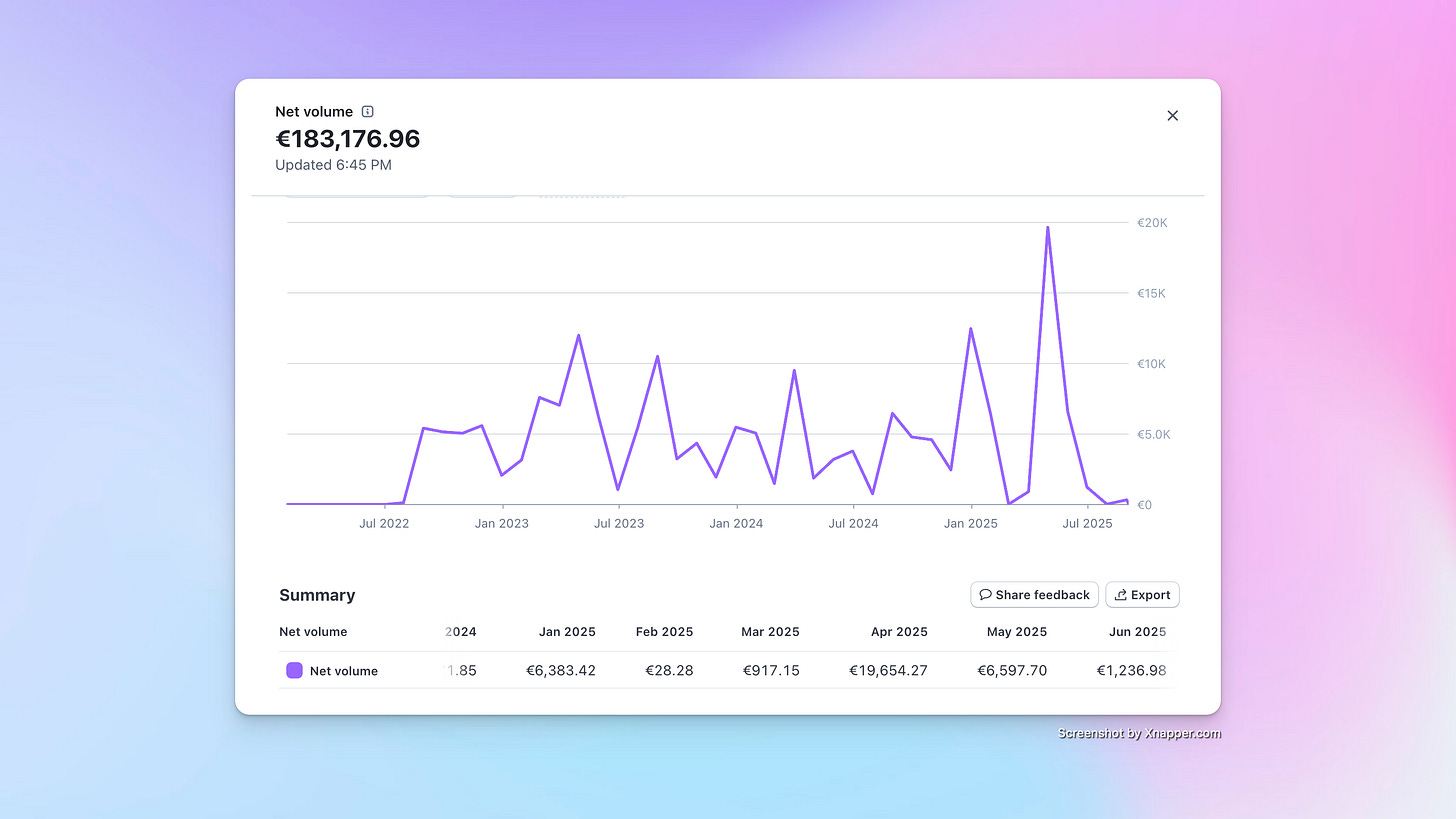How I made side income from Jetpack Compose: My journey
Learn how I built a successful side income from Jetpack Compose through content creation, book writing, and course development. My complete journey.
When Android developers think about side income, the usual answers are freelancing, consulting, or building a small app to monetize. I went in a different direction. A slower one at first, but one that snowballed into something bigger than I expected.
It started with me just sharing thoughts online, with no clear plan. Over time that turned into a book, then a course, and eventually a consistent income stream. Here's my full story.
Years of Sharing and Showing Up
For 10+ years I had been posting Android tips, opinions, and code snippets on X (previously Twitter). Nothing polished, just honest takes from my day-to-day work. I normally tried to have a critical mindset and expose my honest perspective on things when I found it valuable. And a little bit of raging from time to time as well!
I also spoke at national and international conferences like KotlinConf, Mobilization in Poland, and many others. Started small, then went for bigger events. That helped me reach new audiences, connect with devs around the world, and position myself as someone others could rely on for valuable Android content.
I didn't have a product in mind. I just liked to share what I was learning, both online and on stage, and over the years I grew a good sense on identifying what topics people were most interested in. But these things compound. Consistency + visibility builds trust. By the time Jetpack Compose came around, I already had a public image as someone people turned to for Android knowledge.
That was the foundation for everything that followed.
The Jetpack Compose Moment
Then came the announcement of Compose alpha 🙀
I'm sure I was not the only one, but I could immediately see how big it was going to become. Coming from my previous experience building sites in React, the parallels were obvious: declarative UI, smart diffing, state-driven rendering, lifecycle-aware effects... It was the same mental model all over again! but this time adapted to Android. And the fact that part of the original Compose team had worked in React before made it even more obvious.
It was clear to me: Compose wasn't just another library. It was the immediate future of Android UI, and every company would eventually migrate, inevitably. The only question was how soon.
That's when it hit me: if this was going to redefine Android UI development, then there would be demand for people who really understood it deeply.
On top of this, I also knew that diving into the internals of the View system had been a huge leap forward for me in the past. I knew that offering the same perspective for Jetpack Compose would help others as well.
Writing the Book
Only a few days after the first Compose alpha release, I had already subconsciously made the decision to write Jetpack Compose Internals. And I wanted it to go deeper than just "how to use Compose." I wanted to explain how it worked under the hood, and help people to use it correctly and efficiently.
But timing was everything. I made it my goal to release the book on the exact day Compose 1.0 stable dropped. If Compose was going to make a splash in the industry, I wanted my book riding that wave. But I had a significant problem: The book was just barely started and there wasn't enough time to finish it.
To make it possible, I chose Leanpub. This platform would let me prelaunch the book with only part of it written, then keep delivering updates. That would allow me to hit the deadline without compromising the quality of the content.
Finally, I decided to not work with a publisher. Why give away a big cut when I could do it all myself? Writing, editing, promotion... yes, it was more work, but the audicence was already there, and it also meant full control for me. Publishers take a huge cut from authors today, to the point of making the deal very unfair.
Launch and Positioning
The strategy worked. On Compose 1.0 launch day, my book was out too. That timing alone positioned me as "the Compose guy" overnight. I became the go-to reference for anyone looking to understand Compose internals.
Numbers were great for such a niche book: First month revenue was around $15k 🎉.
After that, sales dropped gradually every month, and ended up stabilizing around $2k per month for quite a while. This was a huge motivation boost for me to keep writing what I wanted to be the best Compose book in the market.
Even years after that, it still brings in $500–$1k per month, depending on how much I promote it.
This is how normally tech books behave. You can be lucky to get a viral boost at launch, especially if you have a good strategy and timming. Maybe some months after if too. But after that, it's down to consistent promotion and SEO. If you stop talking about it, people simply stop buying. That is something that I have learned during this journey.
Proof the Bet Was Right
Fast forward to today: Compose is the standard for building Android UI. Companies across the world are migrating. Almost no teams out there are sticking with the View system anymore.
That decision I made back in the alpha days proved to be the right call. And that's the thing with tech trends: if you catch them early, you can ride them for years.
Promoting It Myself
One myth to clear up: no product "sells itself". There might be some exceptions, but in general that is really hard.
Yes, I had great timing. Yes, the topic was hot. But without me actively promoting the book on X, on my newsletter, and in other social networks, it would have faded out much faster.
Promotion is a continuous job. It doesn't feel glamorous, can be boring, but it's the difference between something dying after launch and something that keeps paying back.
Expanding Into a Course
The book was a success, but I knew not everyone learns from books. I also had some good skills giving technical courses that I acquired when working as a trainer for another company, so I decided to build a course and expand on all the topics in depth. My mindset on this was to not create a course that would barely scratch the surface, or just recap the book, but to go even deeper and cover all the topics in much detail. I really wanted it to be useful and worth for people to pay for.
I also decided to make it a cohort in the first place: I would record all the content, provide a support channel for doubts and interesting conversations, and deliver it over several weeks in a structured way. That would allow me to expand the content so much and explain all the topics as clearly as possible.
I built the ✨ Jetpack Compose and internals cohort-based course ✨. And it absolutely blew up. It was an absolute madness that I can't even believe to this day, honestly. Total revenue ended up at around $183k 🤯🫣
Read the full story 👉 https://composeinternals.com/how-i-made-side-income-from-jetpack-compose



